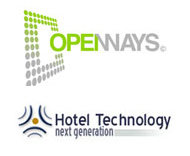OpenWays CEO Invited by HTNG to Talks about Mobile Key

As part of the Hotel Technology Next Generation association event in Berlin, Pascal Metivier will address the growing hoteliers demand today to leverage mobile technologies for offering front-desk bypass solutions to guests expecting a self-service option when traveling;
The panel also will inform hospitality's technology leaders on mobile standards, including NFC
Berlin, Germany - November 17, 2011 - Today senior hotel IT executives from around the world will receive an update on mobile standards and learn why leveraging mobile technologies for front-desk bypass and guestroom access is critical to meeting travelers' demands, maximizing operational revenues and building strong competitive market advantages. The panel discussion is held during the Hotel Technology Next Generation (HTNG) Infrastructure & Device Forum Members Meeting at the Grand Hyatt Berlin.
Pascal Metivier, CEO of OpenWays, will participate in the panel discussion. He is widely recognized within the global hospitality and security industries as a specialist, responsible for several related technology patents now in existence. Metivier also is the inventor of several Near Field Communication (NFC) patents and patent filings. In 2009, he launched the hospitality industry's first global mobile-based access-management solution: "Mobile Key." With 20 years of electronic-lock/door-hardware and access-management expertise, Metivier developed a way for travelers worldwide to use any of the 5.8 billion cell phones on the market today (any network and any OS standards) as a mobile room key. This ubiquitous, fully interoperable and highly secured solution is being deployed by major hotel chains. It is the only solution in production today.
"We are glad to be invited by HTNG to discuss the Mobile Key business solution, as it is first and foremost a business tool supported by technologies," Metivier said. "There is a lot of confusion today across the industry about RFID and NFC technologies and standards. Because there are multiple NFC standards which are always changing, it is no longer accurate to say that purchasing an RFID door lock today will guarantee compatibility with the new generation NFC-equipped phones when they become widely available in the future. Some hoteliers are starting to realize that investing in RFID locks will not necessarily offer them the advantages they were initially told to expect from NFC."
A recent NFC pilot, conducted in a Stockholm hotel coupled with basic RFID locks, helped the industry unveil numerous challenges that need to be addressed for properly planning an NFC implementation.
"By simply observing some of the few guests that were offered an NFC phone to try during their stay, it was obvious to see that without specific one-on-one guest training, the user interface and the lock-to-phone interaction were an issue," Metivier said. "Also, due to the limitation imposed by the new NFC 'SWP' standards, guests had to use phones connected to one single mobile carrier in order to use the service.
"Even though fewer than 30 guests were able to participate in the trial, it was a very good learning experience, and is a base for building improvements to making NFC viable for hotels in the future," he said.
"In parallel with the NFC pilot, the same hotel chain tested the OpenWays Mobile Key solution. Eventually, the decision was made to deploy Mobile Key by OpenWays since it is a simpler, more reliable and truly ubiquitous solution compared to going forward with implementing NFC. This was achieved with great success in the further hotels deployed to date while many more hotels will deployed in 2012 across Scandinavia with this hotel chain."
Positive news that resulted from all 2010 trials of mobile-based front-desk bypass solutions – regardless of the mobile technology used – is that all guests were thrilled with the concept of using a Mobile Key because it directly responds to the growing demand for self-service options among global travelers.
Confusion about NFC
Considerable confusion also exists over the length of time it will take for NFC handsets to reach critical mass, permeate the market and make an NFC-only based solution relevant enough to achieve the business objectives of mobile-based self-service options. When a few million NFC phones will finally be deployed in the next few years, they will represent just a small percentage of the world's 6 billion cell phone users. This supports why NFC has a long way to go before achieving any relevant critical mass.
"The true cost of NFC is significant if not implemented in the right way, and its ecosystem is very complex," Metivier said. "Phone carriers are intending to charge significant fees to support NFC. If a hotel chain wants to offer an NFC service to its guests, it will have to make deals with up to 1,500 carriers in the world, pay considerable fees, and always wonder if its customers are carrying the right phones to support the service. It's simply not realistic for the hotel industry to do so. As part of this panel discussion, we will address the cost implications and challenges of NFC and how to deploy it properly."
Hoping that travelers will "maybe" obtain the right NFC-compatible cell phone from the right carrier in the future will cause significant delays in hoteliers' abilities to offer self-service options for front-desk bypass. Given the changes in standards, expecting that an investment made today in RFID locks will truly work with next generation NFC phones is a very risky bet.
The bottom line is that hotel owners and operators simply can't afford to wait for an "if-come" solution for mobile-based front-desk bypass. They need a mobile solution that is deployable TODAY and adaptable to the future. In addition, they demand a solution that is both mobile carrier and locking-system vendor independent.
"Our role is to share knowledge with hospitality's leading technologists to assist in building standards for the hospitality industry," Metivier said. "The HTNG Infrastructure & Device Forum Members Meeting is the ideal platform for this, and we thank the association for including us in this panel discussion so we can contribute to paving the right road to NFC."
OpenWays is a global solution provider of mobile-based access-management and security solutions. With offices in Chicago, Las Vegas, Seoul and in Europe, OpenWays provides technology solutions allowing for the secure issuance and delivery of access rights and keys process via any cell phone operating on any network. The OpenWays solution is truly unique as it is built on the concept of credential dematerialization. The OpenWays mobile room key solution works on ALL the 5.8 billion cell phones in service in the world today. For more information, please contact Barb Worcester at +1 440 930-5770 or email [email protected]. More information can be found by visiting www.OpenWays.com.
The premier technology solutions association in the hospitality industry, HTNG is a self-funded, non-profit organization with members from hotel and hospitality companies, technology vendors to hospitality, and other industry members including consultants, media, and academic experts. HTNG's members participate in focused workgroups to bring to market open solution sets addressing specific business problems. HTNG fosters the selection and adoption of existing open standards. Where necessary, it also develops new open standards to meet the needs of the global hospitality industry.
Membership in HTNG is open to hotel and hospitality companies, technology vendors to hospitality, consultants, academics, press and others. Currently, more than 400 corporate and individual members from across this spectrum, including most of the world's leading hotel companies and technology vendors, are active HTNG participants. HTNG's Board of Directors alone represents more than 2.3 million guest rooms – with the total rooms impacted by all of HTNG's hotelier members surpasses 4.3 millions rooms worldwide. Workgroup proceedings, drafts, and specifications are published for all HTNG members as soon as they are created, encouraging rapid and broad adoption. Specifications are released to the public domain as they are ratified by the workgroup. For more information, visit www.htng.org.
Andrew Sanders
OpenWays
(732) 707-1869
